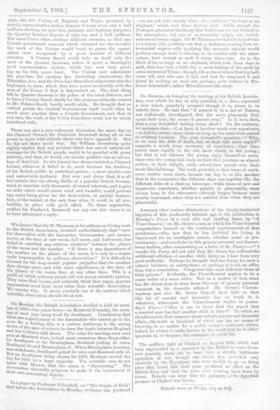Dr, Siemens, on bringing the meeting of the British Associa-
tion, over which he has so ably presided, to a close, expressed a view which, popularly accepted though it is, seems to us utterly false. He said that "it seemed to be a law of Nature, not sufficiently investigated, that the more pleasantly they spent their time, the sooner it passed away." Is it true, then, that a very delightful holiday seems short ? On. the contrary, we maintain that, —if, at least, it involves much new experience, —a holiday seems many times as long as the same time passed in ordinary business. The poet Campbell's question,—" Why, as we near the falls of death, feel we their tide more rapid?" suggests a much truer summary of experionce,—that time passes more rapidly to the old, more slowly to the young ; but that is not because the young enjoy themselves more, since even the young look back on their first journeys as almost endless in their delight, while school-time passes over their heads like lightning. The truth probably is that times of unirk-- some routine seem short, because one day is so like another that in the perspective the different days run together like the different slides of a shut-up telescope; while times of new and impressive experience, whether painful or pleasurable, seem always long in the retrospect,—though longer, because more acutely impressed, when they are painftil, than when they are pleasurable.






























 Previous page
Previous page